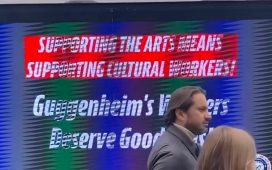President Joe Biden signs his first executive order in the Oval Office of the White House on 20 January
AP Photo/Evan Vucci
The New York-based human rights non-profit Artistic Freedom Initiative (AFI) says that US President Joe Biden’s lifting of the travel ban imposed on Muslim-majority countries by former president Donald Trump “changes the game on the support” the organsiation can offer to artists travelling from the affected countries.
On his first day in office last week, Biden reversed multiple immigration policies passed by his predecessor, signing an executive order ending the ban on citizens travelling from 12 countries. According to the Washington Post, more than 41,000 visa requests have been denied over the past four years due to Trump’s actions.
The ban, first enacted in January 2017 as Executive Order 13769, barred citizens of Iran, Iraq, Libya, Somalia, Sudan, Syria and Yemen from travelling to the US. Iraq and Sudan were later removed from the list and North Korea, Chad and Venezuela were added, following legal challenges that the order was unconstitutionally directed against Muslims (Chad was later dropped). Last January, Trump issued another proclamation, expanding the ban to include certain nationals from Myanmar, Eritrea, Kyrgyzstan, Nigeria, Sudan and Tanzania.
Biden’s reversal of the ban includes “a proposal to ensure that individuals whose immigrant visa applications were denied on the basis of the suspension and restriction on entry imposed by Proclamation 9645 or 9983 may have their applications reconsidered.”
In the run up to the Presidential election on 3 November last year, AFI coordinated an online campaign focused on Trump’s travel restrictions, presenting information on the timeline of the ban and how it could be officially repealed. The organisation also produced a series of Instagram live interviews with, and presentations by, some of the displaced artists who were part of the 2018 exhibition Executive (Dis)Order: Art, Displacement & the Ban at the Queens Museum in New York.
AFI will continue working with artists affected by the ban. “We will be revisiting cases of at-risk artists who reached out to us for assistance during the last administration, but because they were located in travel banned countries at the time, there were few if any viable options for many of them, at least with respect to getting to safety in the US,” says Ashley Tucker, AFI’s director of programmes.
She adds that the artists in its network have reacted very positively. “They are extremely relieved. Those who were impacted are looking forward to reunions with family, being able to visit home again for the first time in years, and to regaining the type of mobility and opportunity that had been cruelly and unjustly denied to them over the last four years.”
However, “it is bittersweet that it’s coming right now, however. As one travel ban is finally lifted, another, in the form of the pandemic, continues to make travel and mobility much more difficult”, Tucker says.









